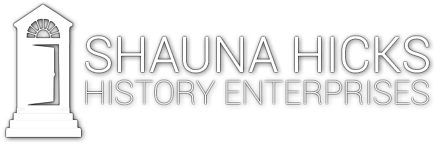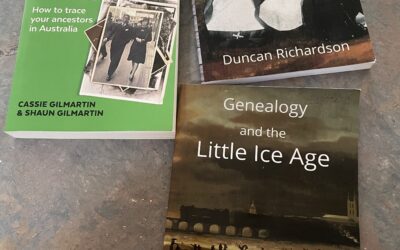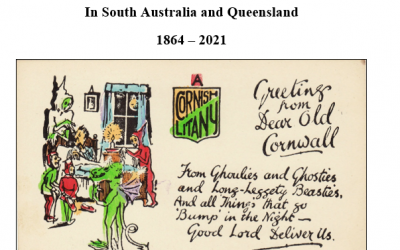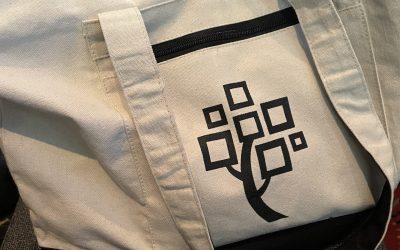 My 31 Activities For Researchers During National Family History Month August 2013
My 31 Activities For Researchers During National Family History Month August 2013
Here are the first 15 activities:
1 Visit your local library and explore the genealogy and local history sections
My local library is the Bribie Island branch of the Moreton Bay Region Libraries and it is also home of the Bribie Island Historical Society. Since I have been living here the Library has run a number of genealogy seminars and I’m giving a talk there on 30 August to finish my NFHM activities. It will be my first talk on the Island and I’m looking forward to it. It has Ancestry Library edition in all its branch libraries but Findmypast Australasia is only available at Caboolture, Redcliffe and Strathpine libraries. Like most libraries there is a Genealogy beginners page with lots of useful links.
2 Visit your State library and see what genealogical information they hold. If distant, do a virtual visit
Living outside of Brisbane it is not easy to get to the State Library of Queensland (SLQ) but I do have a library card which allows me to access all kinds of e-resources and this is a must have if you can’t easily get to a State Library. On my virtual visit, I easily found their family history pages and discovered the online family history info guides. They often have genealogy seminars and I was fortunate to hear the Genealogy Librarian give a talk at the local Bribie family history group – see my Diary of an Australian Genealogist 11 July entry for my tips on SLQ.
3 Apply for a State library card so that you can use their e-resources at home
Already have one and recommend that everyone should apply to their local State Library for access to e-resources at home. Do it now, it’s free and easy to do.
4 Apply for a National Library of Australia e-resources card and explore genealogy resources online at home
Again I have had one of these for years and my favourite NLA e-resources would have to be the UK digitised newspapers including the London Times Digital Archive 1785-2007 . I don’t find them as easy to use as the digitised newspapers in Trove but it is still wonderful that we can access these resources from home for free. Newspapers are a great way to pick up lots of bits and pieces on the family if you don’t get too distracted reading all the other news!
5 Visit your local historical society or a virtual visit to a local historical society where your ancestors lived
My local society is the Bribie Island Historical Society and I recently joined them and have been to a number of meetings. It is the 50th anniversary of the Bribie Bridge opening in October so they have been involved in that and the Bribie Festival is also happening then. We are looking forward to attending lots of events during that month. They also have a database of information and photos which is available to members and you have to go to the local library to use it when historical society volunteers are there. That’s on my to do list for when NFHM ends.
6 Visit your State Archive and see what resources they hold . And look at their fact sheets and guides. If distant, do a virtual visit. Don’t forget the National Archives of Australia (NAA) http://www.naa.gov.au/ – they are a NFHM sponsor with lots of online resources.
It’s quite a distance to Queensland State Archives (QSA) but I quite often use the website to search the online catalogue and to check the indexes. They have a great range of Brief Guides and Search Procedures for the most frequently used records and are a good starting point. Given that I also worked at QSA 1982-1990 and 1994-1999 I’m quite familiar with a lot of the records! I also worked at the NAA for a few years too but I’m constantly amazed at all the new records coming online or being made more accessible through indexing and transcription projects. Check out their new ArcHive project!
7 Plan to attend a NFHM event in your area. If none, suggest your local society hold an event next year.
As mentioned above, I’m giving a talk in my local area but I also travelled down to Melbourne to attend Family History Feast (read my report on this here) and I gave a talk to HAGSOC in Canberra. Being in South East Queensland has its advantages as there were quite a few events in Brisbane and the Sunshine Coast that I could attend as well (if I had any spare time).
8 Visit your local genealogy/family history society and see what resources they hold
I’m a member of both the Genealogical Society of Queensland and the Queensland Family History Society and I have been to the QFHS library a number of times but only to give talks in recent years. I need to schedule a research day for myself and I haven’t even been to the GSQ’s (new to me) library premises so there is another research day to arrange. Fortunately Mum lives in Brisbane and I can organise a sleep over to save travelling up and down the highway. The hard part is finding the time but that is probably common to everyone.
9 If you are not a member, think about joining or perhaps join a society near where your ancestors lived.
I’m a member of both QFHS and GSQ but I’m also a member of the Society of Australian Genealogists in Sydney and the Genealogical Society of Victoria in Melbourne as I have research in both those states too. In the past I have been a member of various UK societies depending on what family I was researching at the time. I really like reading their journals, writing stories for publication or just advertising my interests and some societies have resources on their websites which are only available to members.
10 Tombstones may have more information – have you looked to see if your ancestors had tombstones
Whenever I establish a date of death and burial I always check for a tombstone in case there is additional information. This can include information on births, where they lived previously, other members of the family buried with them and so on. I check the local genealogy societies to see if the cemetery has been transcribed and I also look at the Australian Cemeteries website and the Australian Cemeteries Index website. You need to check both as content varies.
11 Did any family members fight in the South African (Boer War) 1899-1902?
Two of my mother’s uncles went to South Africa as part of Queensland and Commonwealth contingents and I have found their dossiers and other documents online at the National Archives of Australia website. That link will take you to a list of all the different series that NAA has on the Boer War. I found the Price brothers’ photos in Trove which was great as they are the only photos that we have of Solomon and William Price.
12 Did any family members fight in WW1?
We have a number of relatives who went to WW1 and again I have obtained digital copies of their army dossiers from the National Archives of Australia website.
13 Did any family members fight in WW2?
My paternal grandfather and Mum’s brothers were in WW2 and I have paper copies of their army dossiers as NAA has not digitised all of these files yet. The records are name indexed in their RecordSearch catalogue and you can also find them on the WW2 Nominal Roll website too.
14 Check out Twitter to see the latest genealogy news – use the hash tags #genealogy or #familyhistory and don’t forget #NFHM13
I’ve been a regular user of Twitter for years and it is really useful to keep up to date with what is happening in the genealogy world not only in Australia and New Zealand but in the UK, Ireland and North America. I’d be lost without it now.
15 Visit the NFHM Facebook page for updates throughout the month
I am the administrator for the NFHM Facebook page and I have been doing regular updates on NFHM and I was hoping to try and get 1000 Likes before the end of NFHM but I suspect it will only be ca 500 based on current trends. I also placed the photos from the launch of NFHM on the Facebook page which was something a bit different this year.
The remaining 16 activities for researchers will be covered by the end of August!





hello thanks for sharing your ideas great refreshers and new ideas for us that got delayed by current life requirement . bets wishes kind regards clairebear
sorry meant to type best wishes